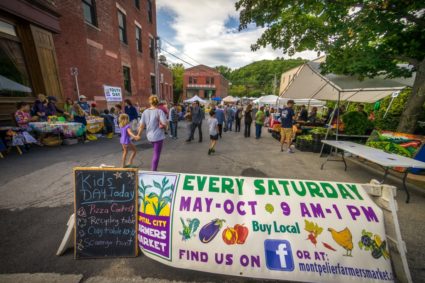How Incorporation & Insurance Shielded Against a Trip & Fall Lawsuit
During a Saturday market in 2008, a customer of the Capital City Farmers Market tripped in an unmarked pothole, fell, and broke her elbow. In August 2011, almost three years after her injury, and just before the expiration of the time period to file a lawsuit under Vermont’s Statute of Limitations, she sued the farmers market in Vermont State Court.

In her Complaint filed with the court, the customer claimed that the market had not fulfilled its duty to maintain safe premises for the public, and that this failure led to her injury. Ultimately, she demanded that the market pay her approximately $110,000 in damages.
Importantly, long before this lawsuit, the market had made two decisions that profoundly affected how this lawsuit played out, in terms of limiting its impact on the market leaders and business as a whole: (1) incorporating and (2) securing insurance.
Decision #1: Becoming “Capital City Farmers Market, Inc.”
In 1977, the market incorporated as a nonprofit corporation. (As of 2017, the market had not sought federal 501(c)(3) tax exempt status.) If the market had not been incorporated, the customer could have sued only the individuals who operated the market. Had that occurred, those individuals would have been left to defend themselves in court (unless, of course, they had personal insurance that covered the claim and provided a defense). Further, if they had lost that lawsuit (without insurance), the court would have looked to their personal assets to cover the costs of the judgment.
Since the market was incorporated, and given the nature of the customer’s legal claim, the customer was limited to suing the corporation–“Capital City Farmers Market, Inc.” As a result, only the corporation’s assets were at stake–not those of the individuals who ran the market.
To be clear, without insurance (which the market had, as discussed below), a business can still be bankrupted by a lawsuit. However, incorporating helps prevent lawsuits and courts from reaching the pockets of the individuals who run the business. For more information on how incorporating or forming as an LLC can protect market leaders from personal liability, visit the Risk Management section of this website and see Governance as a Risk Management Tool.
Decision #2: Getting Insurance Coverage
In addition to incorporating, the market took a second step to protect itself from being undermined by a lawsuit: it secured and maintained general commercial liability insurance. Because the market had insurance and because the insurance covered the customer’s claim, the insurance company covered all of the market’s legal fees related to the lawsuit–almost $25,000–as well as the $11,000 settlement that brought the lawsuit to a close. Without insurance, the market would have had to shoulder litigation costs on its own.
By the end of the lawsuit, despite the substantial legal fees and settlement cost, the market and its leaders remained relatively unscathed.
For more information on how insurance can help protect markets, for more information visit the Insurance as a Risk Management Tool page.
Lessons Learned
Looking back, Kevin Thompson, the market’s treasurer at the time of the accident and lawsuit, notes that the market learned several lessons from its brush with litigation.
According to Kevin, farmers markets should:
- Incorporate (or form an LLC) to help protect the individuals who run them from personal liability for market matters.
- Secure and maintain general commercial liability insurance, and whatever other kinds of insurance are appropriate.
- Have written agreements with their property hosts that clarify responsibilities for property maintenance and repair. One wrinkle in this lawsuit was the fact that the market didn’t own or lease the land it operated on. It simply had oral permission from the lot-owner to operate there. As a result, the market felt it had no right to repair the lot. Accordingly, when the market was sued, it brought the landowner into the lawsuit (by filing this Third Party Complaint), alleging that the landowner, not the market, was responsible for maintaining and repairing the premises at issue. According to Kevin, a written arrangement that clearly spelled out which parties were responsible for what upkeep might have (1) prevented the incident from occurring or (2) helped the market defend itself against responsibility for the accident. Today, partially because of the lessons learned from this lawsuit, the market maintains a written sublease with the City. For more information on farmers market leases, click here. For more information on managing a market's relationship to its host site, click here.
- Inspect their grounds to ensure that there are no unsafe conditions, fix unsafe conditions as they arise, and, if they cannot, mark potentially unsafe conditions with signs, cones, safety tape, etc. (For more on safety measures that farmers markets can take on market day to prevent or minimize the chance of accidents, click here.)
- Keep meticulous records. In response to the customer’s lawsuit, the market’s board had to supply over two years worth of board meeting minutes (documenting discussions of the incident) to the litigating attorneys. For more on the significance of recordkeeping, click here.
